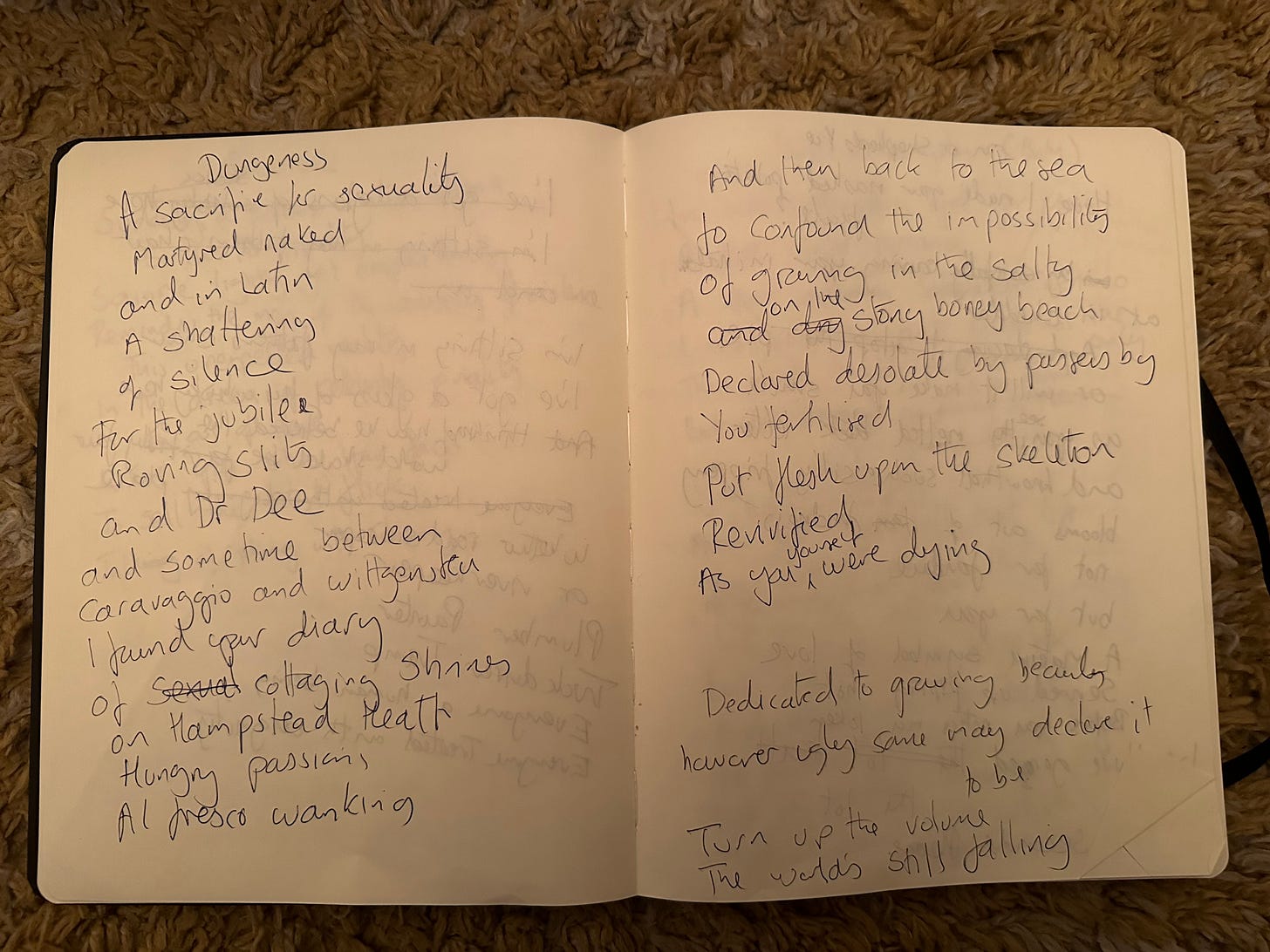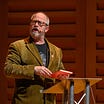Replacing Anxiety with Poetry
Why Robin has turned to poetry to fill the cracks in his brain
I think my poetry lives in the box that used to hold my anxiety.
It is leaky box, and anxiety rushed from the cracks and poured bitter treacle on my path of progression. It is still full of holes, but now it is words rather than panic that flood from it.
Since, May last year, I have filled ten notebooks with probable, possible, even definite, poems. It feels like the most exciting development in my artistic life in the last decade, possibly in my whole career. It has given me a new freedom to express myself in more directions than I have been able to before. Also, for once, I don’t feel like an impostor. I was worried when I took to the stage at Morecambe Poetry Festival, there were many REAL poets in the audience and Attila the Stockbroker in the front row. That feeling at the end of my hour was akin to the feeling I had over thirty years ago when I came off a stand up stage and everything had worked. It was a feeling of a vast new potential and an even greater freedom from the tyranny of the punchline (not that I’ve felt that tyranny for some years now).
Until 2016, my most impressive poem was the one that was published in the school magazine when I was ten. It was about Autumn, the usual basket of words about crunchy leaves and frosted spider’s webs.
I took a bit of a break from performing in late 2015 which “luckily” coincided with the death of my mother. There were many things to be done. I had stopped live performing for my usual reason, an immersive sense of failure blended with self hatred. By January 2016, the pressure in my skull had built up and I knew that I must release some of the words in their before my head bone cracked open, spewing neurones and viscous brain goo across the bus. My first gig back was The Old Labour Club in Northampton with Alan Moore, the day after my birthday. I decided I should risk something I hadn’t done before, so thought that I would write a poem to perform. I started simple and wrote a list poem. It was about all the artists, scientists and grand figures I was better than, not due to what I had created, but because I reached the age of 47 and they didn’t.
It began…
I am now older than
Kurt Cobain, Thomas Chatterton
Jesus Christ and Judas Iscariot,
Lord Byron,
Frida Kahlo
Percy Shelley,
Marilyn Monroe,
James Dean
Joseph Goebbells,
Jane Austen
and Caravaggio
It was a long day on wikipedia, via Django Reinhardt, Lisa Left Eye Lopez and Gilda Radner, it concluded
Charlotte Bronte
Emily Bronte
Ann Bronte
and Branwell
I beat all of you
in years
….but not artistically
It was fun to perform, throwing in odd flourishes, hasty rhythms, and mangled rhymes.
A few weeks later, I built a den with my son in the woods that I played in as a child. The woodland where the roots of every fallen tree became a space pod on an alien planet or a trench for an Action Man.
After my son had fallen asleep that night, I wrote a poem about our day, pondering on whether this would be the final den we built as he continued his journey to adulthood, so slow for him, so first for me.
You don’t need a storyteller now
your bedtime is almost autonomous
but still
one snuggly hug
for safety from the sandman
is today the day?
is this our final den?
And so it continued. A day later, I went to perform it and saw the power of poetry in action, half of the room were crying, including my friend, John, who lost his son in a motorbike crash. He told me he was annoyed with me because he didn’t like poetry and he didn’t cry in public, both those things had changed now.
At a gig in memory of Isaac Newton in Grantham, I suggested that Professor Cox watch me perform the poem as I thought it might be suitable for our next tour show. He agreed. I was now in the envious position of performing my new poetry to audiences of five thousand or more. Feedback was positive, except for one night in Brighton where the words took a mother and daughter by surprise and stirred up a great sadness in them for a brother and son who was gone.
Progress continued slowly, maybe seven poems a year.
A new arena tour on the horizon, Brian told me to write another poem.
Sat on Wembley Central station platform, a poem about starlight and anxiety arrived in one piece, and I performed this one to even more people. My greatest pride is that someone on the USA leg was so taken by the words that he had one of the lines tattooed on his arm.
Emergent complexity briefly defeats the void
Then, I broke the seal and ten poems rapidly became two hundred.
It is a rare day when I don’t write one or two poems.
The trick is to catch them as they form, I cannot hold them for too long and they are often gone if I don’t write them down within the first minute.
A fully formed poem about a shuttered shop, thinking of the day 72 years before, when Davies and Son opened their jewellers, and the pride as they looked on their shops, now gone and a palimpsest of graffiti, appeared by the time I got my book out at the railway station I could see that I had already lost the pattern that I’d seen so clearly just five minutes before.
It is an exciting and a perfect process for the ADHD mind. Something is casually seen, a firework of a thought ignites a trail of words, and then it is on the page and ready to perform to an audience, either in front of them or via bluesky or instagram. There are too many to put out, and some fade as I move further from the original thought, which means there is always a handy backlog.
I think what has happened is that my negative hyper-vigilance has become positive scrutiny. Much of my conscious brain was, until April 2022, preoccupied with seeking possible threats, most of them fabricated by my anxiety. Through medication and diagnosis, this sense of perpetual threat is almost entirely eradicated, which means that my eyes remain beady, but they’re beady for beauty and interesting questions that can be found growing out of a wall, in the shape of a cloud, or in the peculiarity of a conversation I am eavesdropping on (I can’t help but eavesdrop, I find blocking out others’ conversations very tricky).
It means that what I write is instinctual. I find this similarly with taking photographs. I am perpetually excitedly distracted by shapes and form and moss, but I know if I feel the need to stop and think about why I am taking the photograph, then it is a photograph that is not needed.
I find it interesting to see how people receive the poetry and when it does make people cry or move them, because there is so little design in them. Like many other neurodivergent people, I am in a near perpetual state of questions and thoughts and also not always good at, or interested, in following the staid rules of socialising. I can be quite matter of fact about things that other people consider almost taboo, and using this pattern of poetry, devoid of filter, excites me in terms of it possible connections.
It throws away the necessity of concealment.
I think I have found my most exciting means of expression, I hope you have found one too. Do not be shy with your imagination, let it overwhelm you whenever you can.
Robin's brand new website has launched today which includes links to pre-order signed copies of his new book and the first batch of 2025 tour dates. There are LOADS more to come. Visit it at robinince.com








I found this so interesting, because although I'm entering old age I recently discovered that I am ADHD too and it is one of the reasons that I'm a poet. I can express my inner life and follow all the little oddments and flashes which develop into poems. It's a wonderful way to express yourself.
The Sandman poem. Wept when I first heard it. Wept again today re-hearing it. Thank you.